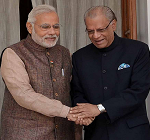The tantalising reference to a blue economy in the official report on Prime Minister Narendra Modi’s discussions with SAARC leaders on 27 May raises some exciting possibilities.
In the segment which describes the Indian PM’s conversation with Dr. Navinchandra Ramgoolam, the Prime Minister of Mauritius, both leaders are said to have agreed to increase cooperation in “the fields of maritime security, renewable energy and the blue economy – including development of related infrastructure.”
Dr. Ramgoolam has been talking about the need to create an “ocean economy” that can develop the full potential of the resources of the ocean, both living and non-living, which can help to expand the GDP and create high productivity jobs. In a speech given last year Dr. Ramgoolam spoke of the need to use deep sea water for a variety of applications, including bottled drinking water. He also visualises developing Mauritius into a petroleum hub. Many of these plans are based on the fact that Mauritius is one of the largest Exclusive Economic Zones in the world. In 2012, the United Nations approved the coordinates which give Mauritius a total area of 2.3 million kilometres over which it can exercise several economic rights.
Experts working with the Mauritius government have highlighted that the blue economy aims to exploit ocean resources in sustainable ways, particularly its fisheries.
It is not clear how ‘sustainability’ is being defined and whether Mauritius’ efforts are in any way linked to the book ‘Blue Economy’, by Gunter Pauli, published in 2010.
A Belgian born serial entrepreneur Pauli is the Founder and Director of Zero Emissions Research and Initiatives, which was launched by the Japanese government and the Tokyo-based United Nations University. The book draws on the experiences of over fifty successful projects across the world that talk about business models which can help shift society from scarcity towards abundance by through an innovation-based, open-source approach that learns from the physical processes of the natural world.
It will be fascinating to explore just what kinds of links the leaders of Mauritius and India discussed when they shared thoughts on cooperating in favor of a Blue Economy. My guess is that the references came up in a tentative manner and the story is yet to be shaped. It bears watching by all those who are passionate about simultaneously restoring the environment and growing businesses.
Rajni Bakshi is the Gandhi Peace Fellow at Gateway House: Indian Council on Global Relations.
This blog was exclusively written for Gateway House: Indian Council on Global Relations. You can read more exclusive content here.
For interview requests with the author, or for permission to republish, please contact outreach@gatewayhouse.in.
© Copyright 2014 Gateway House: Indian Council on Global Relations. All rights reserved. Any unauthorized copying or reproduction is strictly prohibited


